Israeli Scene
Feature
Making the Dream of Aliyah Come True for Retirees
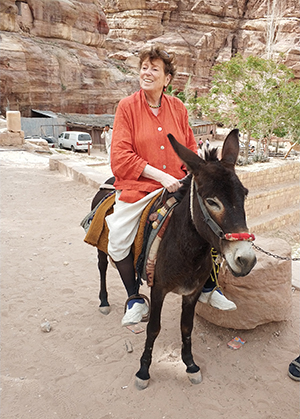
Every morning, Ricki Lieberman wakes up to the sound of the Mediterranean lapping against the seawall outside her apartment in the old port city of Jaffa. Then she pops down to a boardwalk café to meet English- and Hebrew-speaking friends for coffee.
“I knew the bustling, trendy Tel Aviv-Jaffa area would be right for me when I made the decision eight years ago to retire here,” says Lieberman, 70, a former consultant to New York City nonprofits who says her move fulfilled a long-held Zionist dream to make aliyah.
Lieberman says she is “extremely pleased” with her life in Israel, except for being 6,000 miles away from her film-editor son in New York. “I love the weather but I miss my kid.”
Lieberman is one of an increasing number of retirees and other mature adults making aliyah in recent years from North America. “Many of these individuals make aliyah to be closer to family, for the incredible Israeli health care system, the warm spirit of the country and, of course, the awesome weather,” says Marc Rosenberg, director of pre-aliyah at Nefesh B’Nefesh, the nonprofit organization that promotes, encourages and facilitates Jewish immigration to Israel from North America and the United Kingdom.
According to Tani Kramer, Nefesh B’Nefesh’s senior public relations and marketing manager, 563 olim ages 60 to 90 moved to Israel in 2017 from these countries, an increase of nearly 15 percent from 2014. The average age among this group was 69. (The total number of new immigrants from the United States, Canada and the United Kingdom in 2017 was 3,640.)
Retiring to Israel, however, has its share of challenges.
“Retirees go through two changes, both of which require adjustment and involve lots of gains and losses,” says Batya Ludman, a psychologist who counsels many older olim in her practice in Ra’anana, northeast of Tel Aviv. “They must adjust to a new stage in life, and also reinvent themselves in a new language and a new culture.” This includes adapting to Israelis’ assertiveness, she notes. Indeed, when it comes to dealing with aggressive Israeli driving habits, many American-born retirees stick to public transportation; only the brave drive cars.
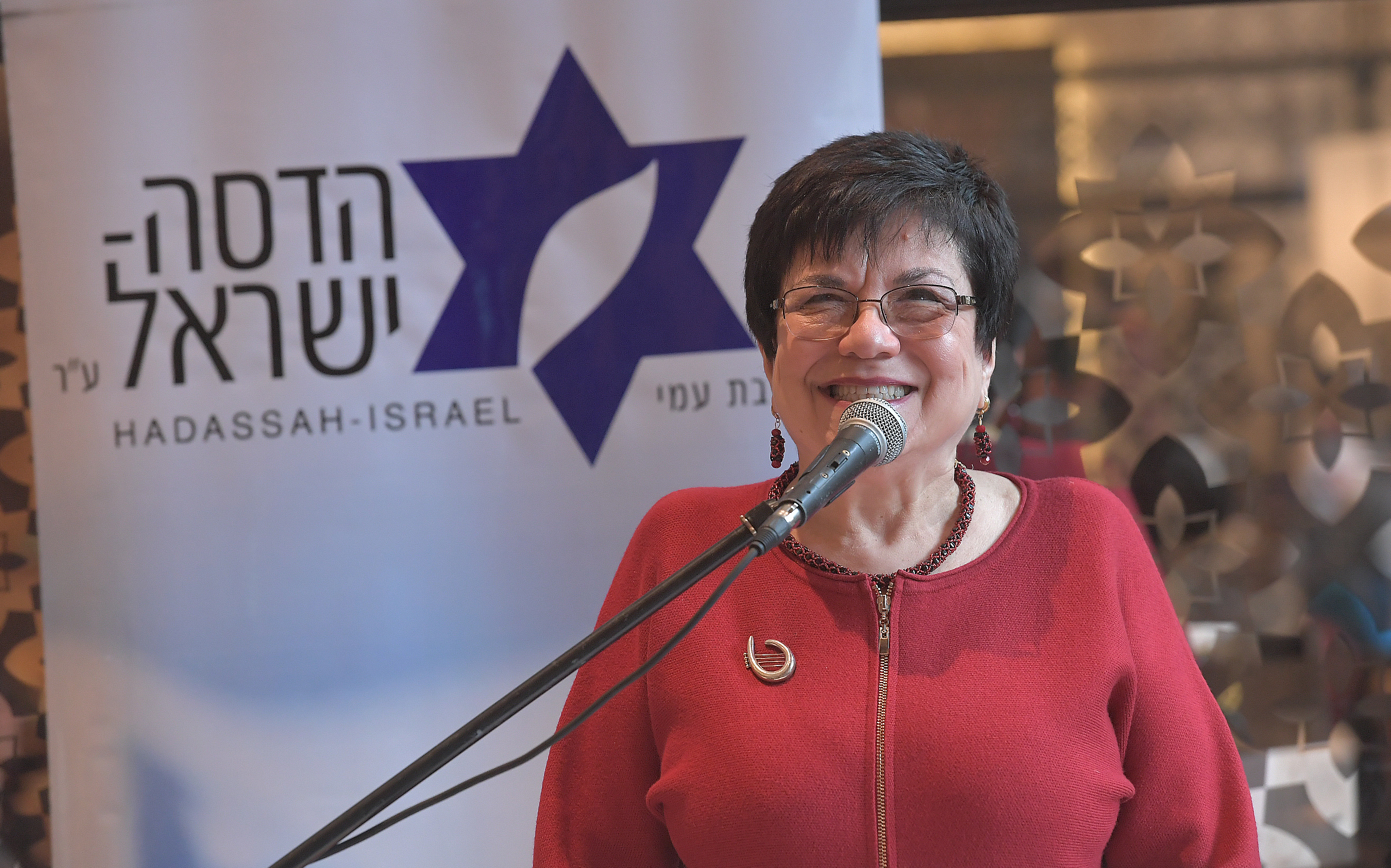
“You’ve got to keep a sense of humor about things,” says Anne Rothenberg, 69, a former day school teacher and president of Hadassah’s English-speaking Tamar-Nechama chapter in Jerusalem. (There are 2,000 Hadassah members throughout the country in 20 chapters that are under Hadassah-Israel’s umbrella.) She and her husband, Jeff, a patent attorney, made aliyah from Albany, N.Y., last year.
While most people spend years, even decades, planning their retirement to Israel, Lieberman spontaneously decided to move to Jaffa while on a 2009 visit to the city, where she had lived for three years in the mid-1970s. “I had the good fortune of coming across a 500-year-old building in the early stages of restoration and decided then and there to buy one of the apartments, with its impressive Arab-style vaulted ceilings and arched windows,” she explains. Gentrified Jaffa has recently attracted many retired Israelis as well.
Despite her relatively quick decision, Lieberman had to do careful financial planning before her move. Israel has a high cost of living, which can pose a challenge for retirees on a fixed income that is vulnerable to fluctuating currency exchange rates. Housing is expensive, too. The price of a two-bedroom apartment in a desirable neighborhood in metropolitan Tel Aviv or Jerusalem can begin at around $1 million; a rental is about $2,500 a month—and food and gasoline prices are high.
“Whereas years ago it was possible to come to Israel with relatively few resources,” Lieberman says,
“I quickly realized that now I could have expenditures similar to those I would have had back in New York.”
Settling in Israel often means downsizing, fewer creature comforts and eating out less often. But with good planning, retirees can live a comfortable life. Many manage to take vacations outside the country and almost all enjoy traveling around Israel on their own or in organized groups.
Retirees need to think carefully about where to make their home base. Josie Arbel, director of absorption services for the Association for Americans and Canadians in Israel (AACI), an organization that supports English-speaking immigrants, warns against automatically assuming it’s best to move near children and grandchildren.
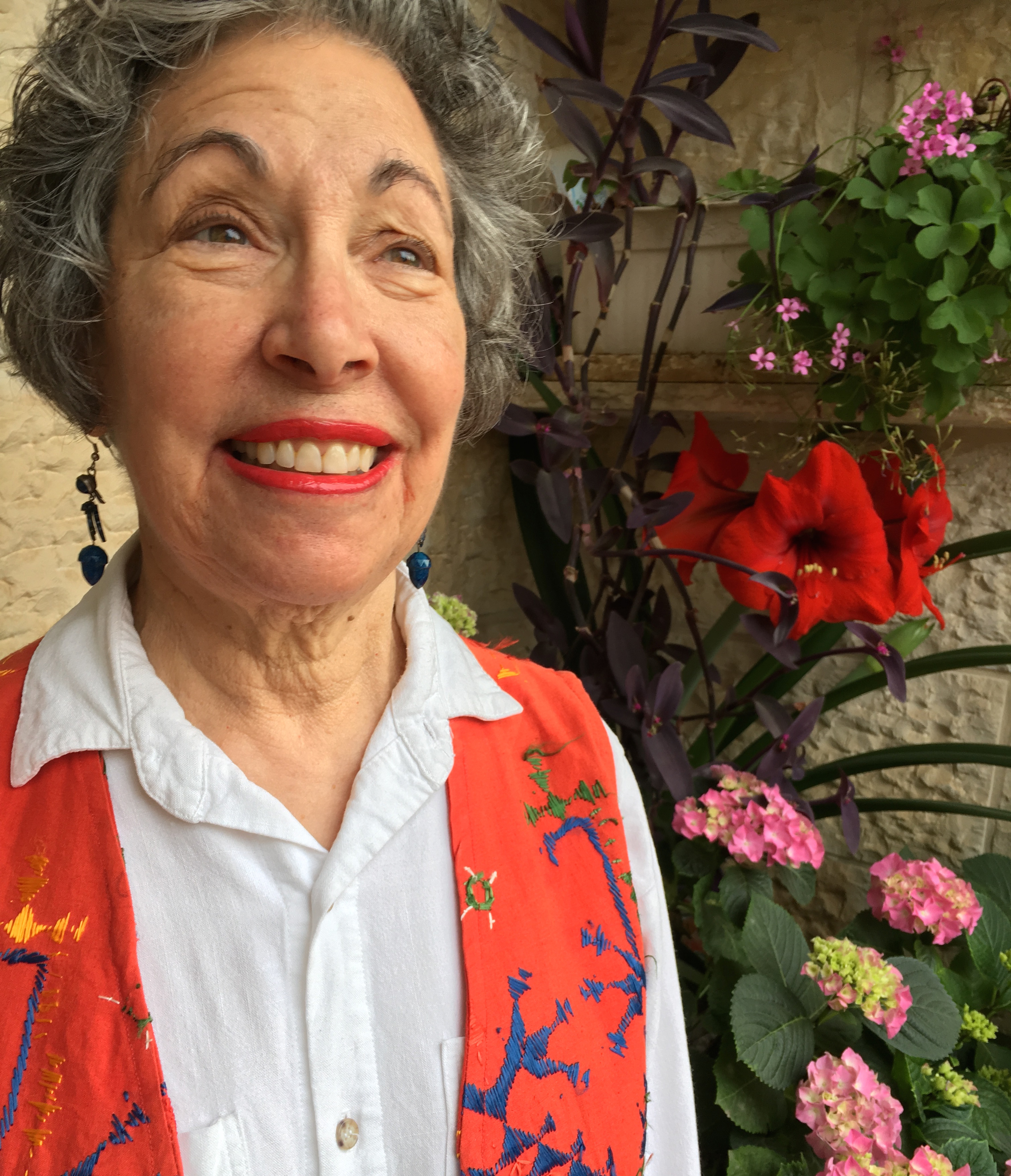
“We’ve seen numerous retirees who didn’t consider locations other than the suburban town or settlement where their children were,” Arbel relates, only to realize months or years later that “the area was too young and they wanted to live among peers.”
Many older immigrants prefer moving to cities with a large English-speaking population and an active social and cultural scene, such as Netanya and Ra’anana. Modern Orthodox families often choose neighborhoods in south-central Jerusalem, such as Rehavia, Baka, the German Colony and Arnona; the ultra-Orthodox tend to move to Har Nof or the nearby city of Beit Shemesh. Both Modi’in and Ra’anana have a mix of religious and secular populations.
Dorraine Gilbert Weiss, 72, loves living in Jerusalem’s Abu Tor neighborhood, which is only a 20-minute drive from her married son and grandchildren, who live in the Beitar Illit settlement south of the capital. She and her 85-year-old husband, Barry, made aliyah from Los Angeles in 2008 and are enjoying a busy life among a large circle of friends made up almost entirely of English speakers.
“One friend leads to another friend to another friend,” Weiss says as she sits in the living room of her light-filled duplex apartment. “It feels like a village. We are all involved in our families’ births, b’nei mitzvah, marriages—and shivas.” A life member of Hadassah, she has chaired two major gift events for the organization since her move to Israel.
According to Kramer of Nefesh B’Nefesh, 68 percent of families who have made aliyah over the past several years identify as Orthodox, and like the Weisses, many late-in-life olim have Orthodox children already living in Israel.
Unlike Dorraine Weiss, Terry Mischel is not a city person, so when she and her husband, Howie, made aliyah in their late 50s from Teaneck, N.J., they settled in Modi’in, a sprawling bedroom community halfway between Tel Aviv and Jerusalem. “Modi’in’s suburban vibe felt right to us,” she says. They arrived with their teenaged daughter, the youngest of their four children. Two of their older children had made aliyah ahead of them; a fourth still lives in the United States. A Hadassah life member, Mischel says she always wanted to make aliyah.
“We wanted to live within a short drive of our kids and grandchildren,” says Mischel. “However, at the time, Howie was not yet retired and was seeking employment in Israel, and we wanted a central location.” Howie did, in fact, find a job and worked for seven years in Israel before retiring. In 2006, the couple, now in their mid-60s, bought “on paper” a semi-detached four-bedroom house with a private entrance and garden and waited for it to be built in Modi’in’s Buchman neighborhood before immigrating in 2009. “It turns out that a lot of young retirees have moved into Buchman since we’ve been here,” Mischel notes. “And although Modi’in overall is about 15 percent Anglo, our neighborhood is
60 percent English speakers.”
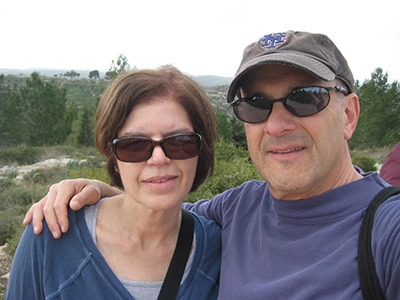
Finding the right balance between remaining in the Anglo “bubble” and pushing oneself to learn Hebrew can be tough for those coming without fluency in the language. Almost all retirees take advantage of ulpan, the Hebrew lessons initially provided free for new immigrants by the government. Some stick with the intensive classes for the long term; others give up more quickly.
Weiss was unable to study in ulpan when she settled in Israel 10 years ago because she was caring for her frail father and her husband’s mother, both of whom the Weisses brought with them to Israel. Since then, she has had to deal with her own breast cancer. Today, her Hebrew is limited, so Weiss asks her son for help with bureaucratic paperwork and strangers in the supermarket to read food labels for her. “I’m a member of the health club at Ramat Rachel”—a kibbutz just south of Jerusalem—“and I have to admit that I do miss being able to understand the gossip in the hot tub,” Weiss jokes.
In contrast, Rose Faber, 75, continues to improve her Hebrew nine years after making aliyah to Jerusalem from London with her husband, Sydney, who is now 76. She takes Hebrew lessons and listens to Hebrew-language radio and television programs. “You miss out on so much if you can’t speak to people,” says Faber, a retired nurse who volunteers two evenings a week with newborns at Shaare Zedek Medical Center in Jerusalem.
For Ron and Shelley Sommer, living in Karmiel, a city in northern Galilee, has forced them to learn Hebrew. When they moved from the Queens section of New York at age 62 in 2013—their daughter still lives in the States—they chose Israel’s periphery over the country’s crowded center. “It’s really integrated and relaxed up here,” says Shelley Sommer. “There’s an active Anglo community, but we also have contact and interaction with everyone: Israeli-born Jews, Arabs, Druze and Bedouin.”
Many new immigrants find the socialized, universal medical system to be excellent and affordable, but it has fewer bells and whistles than Americans are used to. Patients need to get their own referrals and pre-authorizations from their Kupat Cholim (health plan) for procedures and visits to specialists. Family doctors, who have heavy workloads and often cover multiple clinics, can be less proactive in managing a patient’s care. But when it comes to emergency care, surgery and treatment for major illnesses, the retirees interviewed for this article gave Israel’s health care system glowing reviews.
Weiss, who wears a scarf covering her balding head, is currently undergoing chemotherapy for metastatic breast cancer at Hadassah Hospital in Ein Kerem. “The medical care is better and more caring in Israel than in the U.S.,” she says. “The nurses and doctors are amazing. They’ve given me their cellphone numbers, and I can call them at any time.”
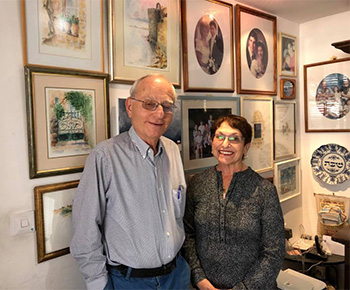
Barbara Greenberg, 73, has had two knee replacements at Hadassah Hospital on Mount Scopus, where she said she received “outstanding care.” Greenberg and her husband, Herb, 76, lived in Westbury, N.Y., where they both worked as special education teachers in public schools. They also founded and led Camp Ramah’s Tikvah program for children with disabilities. In 1999, they retired early to fulfill a lifelong dream of making aliyah, settling in Ra’anana, where their married son and daughter live with 11 grandchildren, nine of them born in Israel.
“Israel was always in my soul,” says Herb Greenberg, who together with his wife started a pre-aliyah preparation group years before the establishment of Nefesh B’Nefesh. However, he warns, “you will have trouble adjusting if Israel is not central to your identity.”
For her part, Rothenberg, the Hadassah chapter president whose two children and six grandchildren live in Israel, finds it inspiring to regularly see the medical center in action and raise funds for specific research projects. “In the U.S., Hadassah was about being social with other Jewish women, Zionism and raising money,” she says. “Here in Jerusalem, Hadassah is literally our local hospital.”
When it comes to housing, Ludman, the psychologist, often encourages older olim to think about senior residences and assisted-living options, of which there are many good choices for those who can no longer live independently. Every city has one or more upscale, full-service, private senior living building or village, on a par with such residences in the United States. For retirees who have family on a kibbutz that has a communal dining room and laundry, they may be able to live there as long as they are still mobile. Seniors in need of assistance or nursing care can get limited home care from the government or pay privately for supplemental care.
After housing and health care, one might imagine that these new Israelis would be concerned about safety issues, yet many say those fears are not front and center. They say they appreciate the security checks in public places and don’t feel personally threatened on a day-to-day basis. They are especially pleased about how safe they feel walking outside after dark.
“We can walk around at night here. That’s not something we could do in London,” says Sydney Faber. But his wife, Rose, acknowledges that she has moments of anxiety during tense periods, such as the wave of stabbings that followed the 2014 Gaza War.
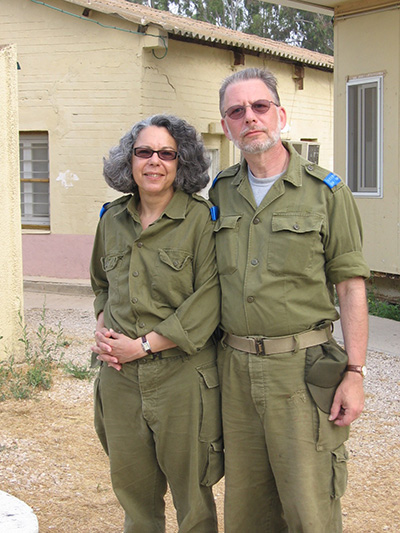
Rothenberg also worries about the threats from Iran. “Sure, the Iran situation is a little nerve-racking, but if anything bad were to happen, I’d rather be here close to our kids and grandkids,” she says as she gazes out the window of her art-filled penthouse apartment in Jerusalem’s Arnona neighborhood.
Indeed, many retirees’ days are filled not with worry but with volunteer work and other enriching activities. Lieberman supports Rana, a Jaffa choir of Jewish and Arab women who sing together. She is active in left-wing Israeli politics and with the Democrats Abroad chapter in Israel. Recently, she started volunteering with the children of African asylum seekers and refugees in south Tel Aviv. She often hosts meetings and social gatherings in her beautifully furnished apartment.
“I consider myself a traditional Zionist,” Lieberman says, “therefore I am committed to working for social justice, pluralism and progressive politics in service of a democratic and Jewish Israel.”
For their part, the Sommers and Mischels volunteer with Sar-El, the National Project for Volunteers for Israel; they regularly suit up in olive-green Israel Defense Forces uniforms and help out on army bases. Howie Mischel, who loves hiking as well as uncovering layers of history, also volunteers with the Israel Antiquities Authority at digs around Modi’in. His wife, Terry, is part of a group of local women who make quilts for wounded IDF soldiers.
Barbara and Herb Greenberg volunteer as English tutors at a local high school. Barbara has taken up acrylic and watercolor painting, hanging her creations among family photos on their apartment walls. Sydney Faber has begun taking art lessons for the first time in his life. In addition, he volunteers once a week at the information desk at Yad Vashem in Jerusalem, plays tennis and sings in the choir at Jerusalem’s Great Synagogue.
According to Rose Faber, getting out of the house, meeting people and giving back to Israeli society is what makes retirement to Israel so meaningful. “There’s so much to do, you could be busy all day every day,” she says. “The key is to get out and not sit at home.”
Even Jackie Schmidt, 98, leaves her home in Kibbutz Ketura in the hot Arava region of southern Israel three times a week to attend a golden age club at neighboring Kibbutz Yotvata.
Schmidt made aliyah from Seattle in 2016 with her husband, Bill, who passed away at age 100 soon after. The Schmidts had moved from Baltimore to the West Coast to be near their sons and their families, and took trips to Israel to visit their daughter and grandchildren on Ketura. Another daughter, who died at age 30, was a founder of the kibbutz.
Schmidt, who has a caregiver, is the perfect example that it’s never too late to make aliyah.
“I’m just sorry” she says, “that we didn’t do it earlier.”
WANTED: RETIREES
“English speakers are a force in volunteerism in Israel,” says Josie Arbel, director of absorption services for the Association for Americans and Canadians in Israel. AACI enlists volunteers to greet new olim at the airport, staff English-language libraries, chair committees, and more. Other organizations seeking volunteers include:
Skilled Volunteers for Israel facilitates volunteer opportunities with nonprofits for mature adults and retirees.
ESRA puts new English-speaking immigrants to work in community projects in disadvantaged sectors.
First Hug seeks volunteers to help care for abandoned babies.
Israel Museum and Yad Vashem seek docents.
Lone Soldier Center prepares care packages for soldiers, serves Shabbat and holiday meals and more.
OneFamily mentors children and teens affected by terror.
Sar-El places volunteers who have already made aliyah on Israel Defense Forces bases. Americans looking to volunteer at army bases should contact Volunteers for Israel.
The Schoolhouse teaches English to African refugees and asylum seekers in Tel Aviv.
Yad Sarah helps provide health and home care services to people of all ages, with special programs that support older adults and children and adults with disabilities.
Renee Ghert-Zand is a freelance journalist covering Israel and the Jewish world from Jerusalem, where she lives.










 Facebook
Facebook Instagram
Instagram Twitter
Twitter
Marcia Sokolowski says
Excellent article!
Michelle Rose-Reardon says
I want to retire to Israel. The opportunities to be of service gives me a direction. Thank you!
Metuka d’Sabetai Rosenthal (BenShoua) says
Hi! This was a wonderful article, I’ve been thinking about making Alia for over 20 years! Now that my daughters are married, and I have retired, I think I am just going to visit and travel around and explore all my options about where to live. My Israeli friends tell me they have high-speed trains, so just pick the neighborhood that you like, because when you want to go to Tel Aviv or Jerusalem, don’t worry public transportation will get you there. So that’s good to know because living in Southern California, you really can’t be without a car!
I am looking for an artist community, and I have heard that Settling the Negev, Would be a good possibility. We’ll see, if anyone can give me more information or brochures on all the costs involved I would appreciate it.
Sarah Pascal Belzer says
You might enjoy Zichron Yaakov
https://www.youtube.com/watch?v=vcBJAUtf9tA
Ron says
I was once a student at WUJS in Arad. Back then it had an artist’s program for those wanting to do the program but focus on art at the same time. WUJS, the World Union of Jewish Students, left Arad and I believe still operates in Jerusalem. Not sure if the program is still the same or what the age requirements are. We were in Arad, which is in the Negev, back in 2018. It has grown maybe 3-4 times it’s size and lost the charm of its former self. The Negev has many towns, but be advised that there you will find buses, not high speed trains. You can check out Egged’s bus routes online, in English even. (Egged.co.il) Zichron Ya’akov is definitely an artist area. It is on the coast above Caesaria. It may be on the expensive side when it comes to real estate, however.
If learning Hebrew is important to you, find a place with a small percentage of English speakers. That’s what Arad was like, and I learned most of the Hebrew I know from being in that environment. Jerusalem and Tel Aviv are not much conducive to learning the language. Good luck – or as we say b’hatzlacha!
MORT (MENACHEM) SCHARFMAN says
RETIRED WMMY AWARS WRITR AND PROFESSOR OF CREATIVW WRITING FOR STAGE, SCREEEN AND TV A AND CERIFIED PART-TIME PSYCHOTHERAPIST WHO CRAVES TO SPEND THE RESTD OF MY DAYS PRODUCTIVELY.
Susana Boerner says
Enjoyed reading your articles
I live in Florida, USA
Originally from Argentina
I looking to live in Israel for a year, is there a way you can help me
Thank you
Susana Boerner
Gail M Boyer says
I am 63, in relatively good health, and am interested in living on a kibbutz that would be mutually beneficial. I had heard years ago that being an Ameican Jew allows me a dual citizenship; is this still true? Are incentives still in place to help expedite the aliyah process?
Rivka says
I was in Israel 1sr time in 1956 on Kibutz Givat echud. Near Hadera for 1 year. Should have ,could have stayed. NO I went back to the UK . Then went back many time’s The last time was 2 yrs ago. It’s difficult, However , I do have Israeli Citizenship. Which I am very proud to have. And I really only feel great when I am in Eretz. Gail go for it! What have you got to lose? You will feel so proud. Being in Eretz . And meeting folk from all over the world. By the way I did not mention I was a Volunteer on kibbutz Kfar Aza. On the Gaze Border for the Yom kipper War 1973, PS . Call the Israeli Embassy. There is 1 in Los Angelos . They will guide you thru the whole Process. Good Luck! ( You are the only 1 that can make the decision.) P.S . I am not sure how the kibbutz work . I know some do not take Volunteer ‘s anymore.